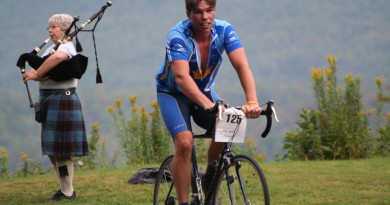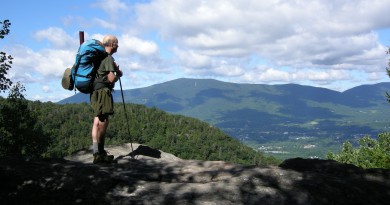Get Out and Get Paid: Some Cool Gigs for Vermonters Who Want to be Active Outdoors

By
Kirk Kardashian
Posted February 24th, 2010
With all the talk about the flagging economy and high unemployment rates, you rarely hear that these times can also create an opportunity to try a new career, something more aligned with who you are and how you want to spend your time. For people who value being outdoors, engaged in activity that replenishes the soul, this might be a perfect chance to get a job that gives you the flexibility to ski or bike on an average Tuesday morning. Finding such a job takes a little creativity, but it’s usually worth it.
Here are some examples of full-time and part-time jobs that can get you outside and get you paid.
BIKE TOUR LEADER
What you do: “I facilitate people having a good time,” says Bill Reuther, a tour leader for Bike Vermont, a Woodstock-based company that organizes end-to-end bike tours aimed at the 40- to 75-year-old set. They ride 25-60 miles every other day, stay at nice bed-and-breakfasts along the way, and eat good food. As a tour leader, you do all those things, too, but the clients’ comfort is your responsibility, so you need to be empathetic, patient, and happy to help riders learn how to use their gears. What else? “I make ‘groupness’ happen,” Reuther says. In other words, he helps perfect strangers have a good time together.
What you need: Since you’re on a bike for five to seven days at a time, you need to be reasonably fit. But not a superstar rider. You only have to be as fast as the slowest client, Reuther advises, since one tour leader always pulls up the rear. Also, you need to know basic bike mechanics, first-aid and CPR, and enjoy being with people.
Why it’s awesome: You’re riding your bike, and getting paid to do it! People on vacation are happy and fun to be around. Good food. Great co-workers.
What’s tough: Being away from family for a week at a time can be challenging, Reuther says. Also, when you’re on a tour, you’re always on duty, 24-hours a day. “That can be a little stressful,” he says.
PHYSICAL THERAPIST
What you do: When Jamie Belchak, the rehabilitation manager at the Rutland Visiting Nurses Association, isn’t overseeing therapists and ensuring timely delivery of care, he’s out in the field helping people get back on their feet after an injury or an illness. On any given day, he could be teaching someone with a broken hip how to increase her core strength, or showing a recent heart-bypass surgery patient how to conserve energy. But, because physical therapists are in short supply, he can dictate his schedule, and that leaves him plenty of time for telemark skiing, and riding his road, mountain, and cyclocross bikes.
What you need: These days, a doctorate in physical therapy, which takes about six years of undergraduate and graduate school to obtain. Then you need clinical affiliations and to pass the boards in the state where you want to practice.
Why it’s awesome: Flexible schedule, high mobility and a deep knowledge of how the body works. And the money’s not bad: starting physical therapists can earn $40,000 to $50,000 per year.
What’s tough: Though the pay is good, education expenses are much more than they used to be.
DIRECTOR OF ADVENTURE PROGRAMS
What you do: Run the recreation and co-curricular outdoor programs at a college or university. For Bruce Saxman, who holds this position at Green Mountain College, the job entails teaching students paddling, ice-climbing, backcountry skiing, and even surfing. It also includes organizing the annual wilderness adventure program for incoming first-years. Much of his time, however, is spent turning outdoor-minded students into leaders who can guide trips for his department.
What you need: There are lots of ways to get into outdoor adventure education, but Saxman highly recommends having some professional-level guiding experience. It also doesn’t hurt to have a degree in recreation.
Why it’s awesome: Everyday is different, but you’re almost always outside doing something fun. And when it’s time to do the paperwork, you need a rest anyway.
What’s tough: “People don’t think I have a real job,” Saxman says. Also, when you’re teaching you’re usually doing the activity at a lower level than you would on your own, which can be frustrating. “But I get no sympathy,” he laments.
HIGH SCHOOL NORDIC SKIING COACH
What you do: Starting in mid-November, organize dry-land training, which includes roller-skiing, hiking, and running. When the snow falls, you’re running ski practices or coaching at races six days per week. Bruce Smith, the head coach at Mount Anthony High School in Bennington, puts it this way: “I get paid a pittance to go skiing everyday.” Coaching at a public high school isn’t a full-time job, so Smith is also the school-based clinician at Mount Anthony, and coaches the middle school cross-country running team.
What you need: “I basically fell into it,” Smith says. He came from a running background, so he new how to train. The former varsity skiing coach mentored him, and he got a lot of help from other ski coaches. In the Vermont high school Nordic community, Smith says, “people know that it’s about the kids feeling good about what they do.”
Why it’s awesome: “It keeps me young,” says Smith. You get to hang out with driven, goal-oriented athletes, and see the sun go down from a ski trail every afternoon in the winter.
What’s tough: It ties you down. “My winter is pretty committed,” Smith says. “Also, the pay is nominal. Per hour, you’d probably do better working at McDonalds.”
DIRECTOR OF A RECREATION/FITNESS NON-PROFIT
What you do: According to Chapin Spencer, the executive director of Local Motion, a Burlington-based organization that advocates for active transportation, he spends a lot of his time doing “new venture development.” That means assessing community needs, fundraising, grant writing, and networking, all with an eye towards how to make your community more bike- and pedestrian-friendly.
What you need: If you’re Spencer, you just need an idea and some passion. Ten years ago, he and some friends started Local Motion by securing grants and appealing for membership. But he says there’s a lot more opportunity for organizations that connect people to the outdoors. With corporations like Burton and Terry, and events like the USA Triathlon Championships coming to Burlington, says Spencer, “Vermont has a great chance to sell itself as an outdoor destination.”
Why it’s awesome: An active office culture. Everyone at Local Motion either bikes or walks to work most of the time. Plus, doing “mission-driven work,” Spencer notes, is “absolutely exciting.”
What’s tough: The days spent doing paperwork, and the irony of encouraging people to be active by sitting at your computer writing grants.
Kirk Kardashian gets paid to get out and write about skiing and biking. You can see more of his work at www.kirkkardashian.com.


